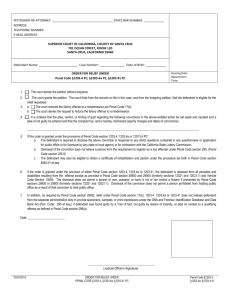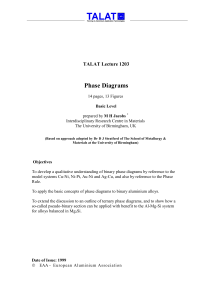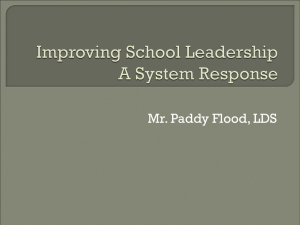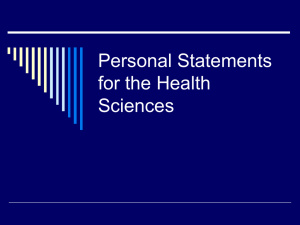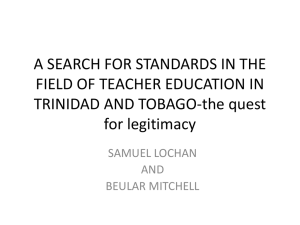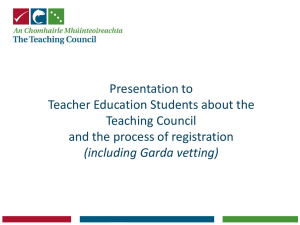1395137472ED 1203
advertisement
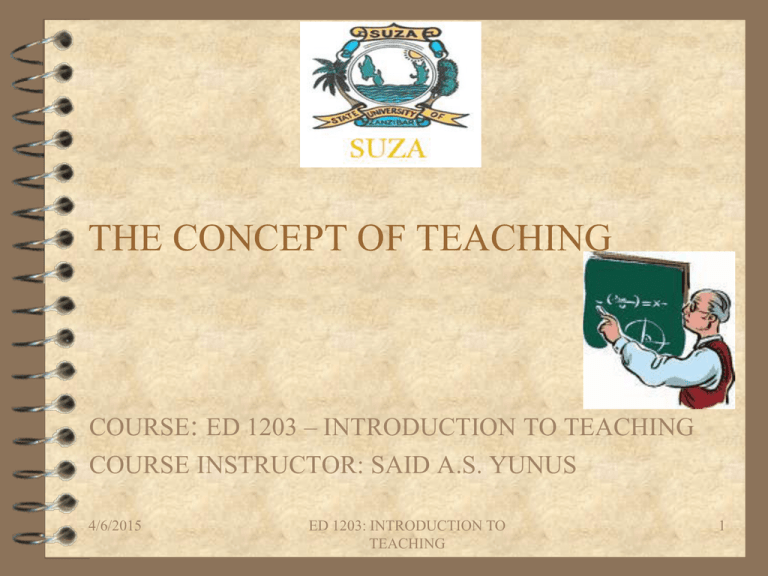
THE CONCEPT OF TEACHING COURSE: ED 1203 – INTRODUCTION TO TEACHING COURSE INSTRUCTOR: SAID A.S. YUNUS 4/6/2015 ED 1203: INTRODUCTION TO TEACHING 1 Objectives At the end of the lecture students should be able to: Define the meaning of teaching Describe teaching as a profession Explain teaching as both an art and science 4/6/2015 ED 1203: INTRODUCTION TO TEACHING 2 MEANING OF TEACHING Definition of teaching given by various psychologists: H.C. Morrison – Teaching is an intimate contact between a more mature personality and a less mature one which is designed to further the education of the latter. Edmund Amidon - Teaching is defined as an interactive process, primarily involving classroom talk, which takes place between teacher and pupil and occurs during certain definable activities. 4/6/2015 ED 1203: INTRODUCTION TO TEACHING 3 Cont… B.O. Smith – Teaching is a system of actions involving an agent, an end in view, and a situation including two sets of factors – those over which the agent has no control (class size, size of classroom, physical characteristics of pupil etc.) and those that he can modify (way of asking questions or ideas gleaned.) T.F. Greens – Teaching is a task of a teacher, which is performed for the development of a child 4/6/2015 ED 1203: INTRODUCTION TO TEACHING 4 Cont… Farrant - Teaching is the process that facilitates learning. The teacher has an important role to play because he acts as catalyst, actively stimulating learning. Teaching has been defined by Wells, G. (1982) as cluster of activities that are noted about teachers such as explaining, deducing, questioning, motivating, taking attendance, keeping record of works, students‘ progress and students‘ background information. 4/6/2015 ED 1203: INTRODUCTION TO TEACHING 5 A Working Definition of Teaching “teaching is undertaking certain ethical tasks or activities the intention of which is to induce (cause) learning” 4/6/2015 ED 1203: INTRODUCTION TO TEACHING 6 Relationship between Teaching and Learning Teaching is what teachers do. Learning is what students do. Does a relationship between good teaching and student learning exist? To a degree, but how are they related and to what extent is unclear. 4/6/2015 ED 1203: INTRODUCTION TO TEACHING 7 If such a connection truly exists, then... your ability to teach should be judged on the basis of student learning. you should be held accountable for student learning despite poor parenting, negative attitudes, and other social ills. your pay should be based at least in part on student outcomes. 4/6/2015 ED 1203: INTRODUCTION TO TEACHING 8 There is not necessarily a connection between teaching and learning. some students can and will learn in spite of bad teaching some students will not learn even with the best teaching 4/6/2015 ED 1203: INTRODUCTION TO TEACHING 9 Professionalism in Teaching 4/6/2015 ED 1203: INTRODUCTION TO TEACHING 10 What is a profession? Determines own preparation and training standards Is recognized legally; licensure and certification defined by members Possesses a unique role; specialties within profession determined by members Has its own professional ethics Has procedures for disciplining those who behave unethically 4/6/2015 ED 1203: INTRODUCTION TO TEACHING 11 Features of a Profession Specialized body of knowledge Respect, status and income Autonomy Accountability 4/6/2015 ED 1203: INTRODUCTION TO TEACHING 12 Specialized Body of Knowledge Professionals have mastered a specialized body of knowledge that allows them to deal with their work more effectively than the average person. In other words, the amount of knowledge demanded of professionals, such as doctors and architects, differs significantly from other persons from other fields. 4/6/2015 ED 1203: INTRODUCTION TO TEACHING 13 Respect, Status and Income Most professionals are afforded of high level of respect, status, and income. This is true for several reasons. First, acquiring a specialized body of knowledge requires more rigorous and extended period of training than most other occupations. Such training is needed because the work that professionals perform is more complex and demanding than that other occupations. The fact that professionals hold themselves accountable to a code of ethics and high standards of practice also contributes to their high status and income. 4/6/2015 ED 1203: INTRODUCTION TO TEACHING 14 Autonomy Because individuals in a profession command specialized knowledge that others do not have, they are allowed to carry out their responsibilities with minimal supervision. 4/6/2015 ED 1203: INTRODUCTION TO TEACHING 15 Accountability Professionals have considerable control over who can enter their profession. Furthermore, they create codes of ethics and professional boards to monitor the practices of peers. These boards have the authority to expel members who have violate professional standards of behavior or practice. 4/6/2015 ED 1203: INTRODUCTION TO TEACHING 16 Questions 4/6/2015 ED 1203: INTRODUCTION TO TEACHING 17 THE TEACHING PROFESSION TYPES OF TEACHERS Some teachers are teachers by: Choice Chance Force Accident 4/6/2015 ED 1203: INTRODUCTION TO TEACHING 18 THE TEACHING PROFESSION Can be regarded in three ways: Teaching as a profession Teaching as a mission Teaching as a vocation 4/6/2015 ED 1203: INTRODUCTION TO TEACHING 19 Teaching as a profession “Teaching is a noble profession” The word “profession” is synonymous to: Occupation, job, career, work, line of work The word “professional” means long & arduous years of preparation, a striving for excellence, a dedication to public interest and commitment to moral & ethical values. 4/6/2015 ED 1203: INTRODUCTION TO TEACHING 20 If you consider teaching as a profession then: You must be willing to go through a long period of preparation. You must be willing to go through continuing education (continuous development of potentials) You must strive (struggle) for excellence You commit yourself to moral, ethical and religious values & dedicate yourself to service. 4/6/2015 ED 1203: INTRODUCTION TO TEACHING 21 Teaching as a mission The word mission is derived from the Latin word “misio” which means “to send”. The Webster’s Dictionary defines “mission” as “task assigned”. 4/6/2015 ED 1203: INTRODUCTION TO TEACHING 22 If teaching is your mission then it means: a. It is the “task” entrusted to you in this world. b. It is your assigned task thus you’ve got to prepare for it! c. It calls for a continuing professional education. “Once a teacher, forever a student” 4/6/2015 ED 1203: INTRODUCTION TO TEACHING 23 Teaching as a vocation The word “vocation” comes from the Latin word “vocare” which means “to call” thus vocation is a “call”. 4/6/2015 ED 1203: INTRODUCTION TO TEACHING 24 If teaching is your vocation then it means: You said YES to your call to teach! You commit yourself in the total transformation of the learner. You consider teaching as a lifetime commitment thus aim through the years towards quality teaching. “Teaching may not guarantee financial security but love of teaching has served as a motivating factor to many teachers through the years”. Teaching has remained inspiring & fulfilling. 4/6/2015 ED 1203: INTRODUCTION TO TEACHING 25 Teaching as Both an Art & Science 4/6/2015 ED 1203: INTRODUCTION TO TEACHING 26 TEACHING AS AN ART Teaching as an art: reflective, inventive Art: Teaching is an act of interpretation and self- expression on the part of the educator. The art of teaching involves the adaptations, a teacher must make to accommodate his/her specific situation and style. The art comes from the teacher’s personality, experience, and talents. 4/6/2015 ED 1203: INTRODUCTION TO TEACHING 27 TEACHING AS A SCIENCE Teaching as a science: effective techniques Science: Teaching follows research-based practices to promote student achievement. The science of teaching involves the generalizations from the research about effective teaching. The science comes from knowledge of child development and the structure of the curriculum. 4/6/2015 ED 1203: INTRODUCTION TO TEACHING 28 Effective teaching is a craft Combining science and art makes teaching a craft. It combines the science of educational psychology, human development, communication with a talent for teaching, connecting to learners and the intuitive ability to communicate so that a person can refine and become more competent in the craft of teaching. 4/6/2015 ED 1203: INTRODUCTION TO TEACHING 29 Questions for discussion With examples, explain how teaching relates to learning Based on the four features of profession, with vivid examples explain why teaching is considered as a profession. “Good teachers are born, not made”. Discuss this statement with supportive evidence. 4/6/2015 ED 1203: INTRODUCTION TO TEACHING 30 Evaluation What was useful? What was not so useful? What needs to be Changed? 4/6/2015 ED 1203: INTRODUCTION TO TEACHING 31 Thank You 4/6/2015 ED 1203: INTRODUCTION TO TEACHING 32
